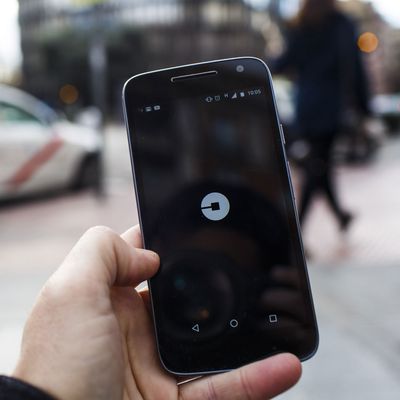
After a year in which we’ve barely been able to go a week without new horror stories emerging from Uber, it seems as though even the company’s staunchest defenders can now agree that the ride-sharing service has a deeply dysfunctional corporate culture — a culture that trickled down through the company from its top executives, and a culture that has taken Uber investors and executives far too long to identify, criticize, and correct.
But what about us — the customers whose mass adoption of a phone-based taxi service has turned Uber into a tech-industry unicorn? In Bloomberg yesterday, Shira Ovide argued that Uber users deserve blame, too: “We might wince when we hear about the people who assemble iPhones working under grueling conditions,” she writes, “but we don’t stop buying iPhones” — nor, for that matter, do we stop hailing Ubers. Today, Farhad Manjoo echoes Ovide’s argument in the New York Times, and tells readers to vote with their wallets. “To encourage a better Uber,” argues Manjoo, “it’s time to play the only card you’ve got: If it backslides or otherwise fails to live up to the promises it’s making now, stop using Uber.”
It’s a tempting argument in part because Uber seems uniquely vulnerable to boycotts: It collects fees directly from its users, unlike its tech-industry peers, which tend to wring value out of their users by selling ad space. That’s part of why this past January’s #DeleteUber outrage scared the company. But the #DeleteUber campaign also demonstrates the limits of the vote-with-your-wallet model. Despite the loss in users, Uber’s numbers kept going up; it added more riders than it lost in the same period, and continues to do so even as more of its internal toxicity bubbles to the surface.
To some extent, this is because Uber acts like a commodity business: It competes with Lyft and other rivals almost entirely on price. As United Airlines will tell you, transport businesses are pretty invulnerable to controversy; even the most morally righteous consumers tend to buy the cheapest plane tickets available. Right now, Lyft and Uber cost roughly the same, and in the categories in which they’re competing — like wait time — the effects of Uber’s enormous and essentially unstoppable network give it a significant edge.
But even that hides the real problem with attempting to leverage consumer power against Uber. The vote-with-your-wallet equation seems simple: If fewer people take rides on Uber, the company won’t make money, and it will be forced to change. The thing is, though, Uber doesn’t actually make money right now in the first place. Uber’s business is perpetually, wildly unprofitable, and its rides are cheap because it uses investor cash to subsidize them. (In the Financial Times, Izabella Kaminska has persuasively argued that Uber is essentially a transfer of wealth, from rich investors and overworked drivers to the middle-class passengers who enjoy below-market prices on their taxi rides.)
Because of the structures of Silicon Valley and venture capital, its users don’t hold direct financial power over Uber. Uber has billions of dollars in cash not because it has collected money from users, but because it has convinced deep-pocketed investors to shell out in exchange for a stake in the company. Sure, Uber needs to maintain a certain level of use — but for the most part, Uber’s drive to keep bringing in new customers is so it can have a bigger y-axis to show investors. As with many cash-burning start-ups, consumer power is real, but it’s indirect, and boycotts can be mitigated with a new influx of cash from investors. Even if Uber’s user base slowed, it’d still have billions left to operate with.
The “just don’t use Uber!” argument — which I have personally tried to live by for years — is also, in 2017, unrealistic for many. It’s an easy argument to make if you live in a city with a bustling public-transit system (even New York’s subway, which craps the bed on an hourly basis). But for many markets that Uber serves, including its home base of San Francisco, public transportation is lacking, and taxi services — which don’t have millions of dollars in tech-focused investment — can’t match Uber’s prices or convenience. In some towns, Uber has partnered with local governments to offer “last mile” service to and from public-transit hubs like train stations. Part of the reason that it subsidizes rides so heavily, in order to keep costs down, is so that people become reliant on the service. “Don’t use Uber” doesn’t mean “take the bus,” it means “budget time for 45 minutes on foot.”
Manjoo, to his credit, recognizes this: “There’s a lot at stake,” he writes. “Ride-sharing, as an industry and a civic utility, is too big an idea to be left to a company like the one Uber is now. The company that wins this industry is bound to become one of the world’s most powerful corporations.” Uber’s cynical play is to burn through investor cash until it can leverage autonomous-driving technology to become what is effectively a privately owned public-transit operation. The response to Uber’s corporate malfeasance should not be to deny Uber your business in the hopes of awarding the ultimate prize to Lyft, itself no pure innocent — it should be to use civic power to ensure that the future of transportation lies in the hands of an organization committed to fairness and justice for its employees and its users. And that means, of course, calling your elected representatives, educating yourself about local politics, and voting with your ballot, not your wallet.





























